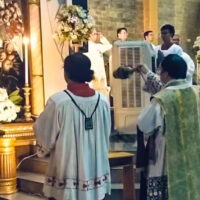Source: Neo Jeremiah Voice of the Young Prophet Newsletter (June 12, 2016 issue)
 We are inviting young parishioners to join us in our Bible study and sharing sessions every Sunday @ 4:00 PM at the Parish Hall
We are inviting young parishioners to join us in our Bible study and sharing sessions every Sunday @ 4:00 PM at the Parish Hall
Click here to know more or
you may contact us:
Globe: 0927-323-6150
Sun: 0932-487-3188
Smart: 0998-854-4091
In today’s gospel (Luke 7:36-50), we meet two different personalities – one, a Pharisee who invited Jesus to dine with him at his house, and the other, a sinful woman, who learned about Jesus’ whereabouts and came unbidden.
By the time this happened, Jesus already began His public ministry. He spoke in synagogues (Luke 4:21-29, 6:6) and to a great crowd (Luke 6:17-26), cured a demoniac (Luke 4:31-37), healed the sick (Luke 4:38-41, 5:12-26, 7:1-10), and even raised the dead (Luke 7:11-17). It can be surmised that Jesus’ host and the woman who invited herself to his home have had at some point, already heard Jesus teach and even perform miracles. However, their response to Jesus and His ministry are not the same.
The initial action of the Pharisee seemed to be that of somebody who accepted Jesus already – he invited Jesus to his house, to dine with him, However, later on, his true thoughts are revealed specifically in verse 39 as he said to himself, “If this man were a prophet, he would know who and what sort of woman this is who is touching him, that she is a sinner.” He was, after all, still testing Jesus; his thoughts revealed that he was doubtful of Him! How you regard a person shows in how you treat them – he did not regard Jesus as a true prophet; hence failed to carry out the usual courtesies practiced by the Jews when accepting guests into their house (it was the woman who performed these). Also, smug about his place in society, – as a Pharisee that stringently obeys the Law, specifically the conduct towards the unclean – he thought that Jesus ought to think the way he does about the woman! He only saw the woman’s sins and not his own. Jesus knew his thoughts and in the text, his name was only revealed at this point as Jesus addressed him by name – Simon (Luke 7:40). Simon the Pharisee’s reservations about Jesus and his blindness of his own sinfulness indicate that he is not yet ready to receive the forgiveness of the Lord.
As for the sinful woman, her actions revealed how much she believed and trusted in Jesus. She came to the Pharisee’s house, undeterred by humiliation she might suffer from doing so. What only mattered is that she will find Jesus there. She acted like somebody who is very much convinced already of who Jesus is. She has not spoken any word to explain herself. She wept and her tears that bathed Jesus’ feet testify to how sorry she is for her sins. She wiped His feet with her hair, kissed them and anointed them with the ointment. She acted as if she already received the best gift there is and only sought to serve the giver.
In contrast to the Pharisee who has always been keen on following the Law, the woman possessed the faith that the former lacked. Despite her sinfulness, her faith opened her heart to Jesus and to His forgiveness, Her faith in Jesus saved her. When she was forgiven, something is restored and remained in her – love.
Strict compliance to the taechings and traditions of the church does not matter if we do not recognize our own sinfulnss and only see the faults of others. It is a pity when that happens; for that means we are already so full of ourselves; we become blinded by self-righteousness. Also it is a tragedy when we no longer believe in the goodness of others and hold ourselves back from forgiving them. With that, we can no longer truly love as we are closing our hearts to Jesus, the source of love and mercy.
God, whose love abounds, forgives those who ask for forgiveness; in turn, those who are forgiven and recognizes so possess and show love. Between the Pharisee and the woman, it is the latter that carried the peace that can only come from God.
~Kring
 Diocese of Parañaque
Diocese of Parañaque












